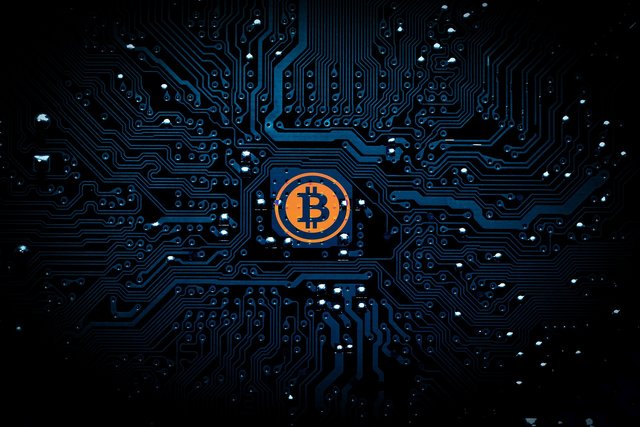Adventures in Disruptive Banking - How the Cryptocurrency Craze Will Topple the Financial Status Quo

I never thought I would work in banking but it only took being a restaurant manager in Tempe, Arizona for two years to realize that’s what I wanted to do. Each day at work, I would bring over the wads of cash we made at this huge establishment. I would leave the crazily busy and frenetic, exhausting atmosphere where I worked long hours to enter the chill lobby of the bank and see my favorite teller, decked out to the nines, cool as a cucumber and counting money for pay. I thought, this doesn’t seem so bad.
It so happened that one of the restaurant’s regular customers, John, had a son at nearby ASU and often came in when visiting the campus. He knew I ran a tight ship amongst the madness, the place seated about 50 inside and 250 outside and was located right by Sun Devil Stadium. As you can imagine it was a tad busy. It was good that John understood my hard working mentality, because a year later, after trekking across country and getting settled in the Burlington Vermont area, I walked into a credit union for an interview and there he was, John the CU President, along with the CFO, ready to ask me questions. Not sure who was more surprised that day.
I ended up getting a job covering maternity leave for the Assistant Controller, and you want to talk about faking it until you make it. It was soon discovered that my penchant for numbers was a bit lacking, but still there was never a question of what I would do after the true Asst. Con came back (to clean things up!), because regulations had just been lifted and credit unions were given a free pass to operate just about anywhere.
Previously, they had been restricted to servicing one company, such as the GE Credit Union, where I worked with John. With the new laws enacted, the name was changed to NorthCountry FCU and it soon had over 100 segs (businesses that could also join) including Burton Snowboard, Green Mountain Coffee and Ben & Jerry’s. Soon after that, credit unions representing towns and counties started cropping up. There seemed no end to the growth. And it was a blast being part of that massive expansion.
What I loved about working in that CU was not just that I got to wear an unlimited amount of hats in a fast growing business, but also that everyone involved in the CU had a share. Every account holder had this one share and thus had a say in the ‘bank’, not just 12 stuffy old white dudes. We all got a vote and profits went back into services, not into the pockets of just a few.
It was also my first job using computers - Word Perfect to start, then Word, plus the amazing banking software they had going on in-house, eventually going on to selling it to other CU’s. There was so much potential and that place is still thriving under the same CFO who hired me to be her “assistant controller”. If you know how bad I am at math you could appreciate that joke. But she and the other staff took to my other qualities well enough.
Five years later, I decided to move back to Maine to be closer to family. Before leaving I had been working closely with the CU President and Marketing Director. I applied to a bank about 30 minutes from where my parents lived, and soon began working as an administrative assistant for Union Trust (now Camden National Bank). Again, I worked directly with the Marketing Director, to this day a good friend, but I also supported the president, being camped right outside his office. I handled all the word processing (including emails) for him and the EVP, and assisted in Marketing, Audit, HR and Commercial Lending. Part of my job was handling the board minutes and packets so I always was in the know as to what was happening.
I’m not going to start in on how awful banks are, because frankly, it was a good job. I was treated well. And because I handled the Pres’s communications, I was first in line whenever there was a tech problem. I was spoiled rotten and rewarded often with bonuses and shares in the bank, not to mention a sweet benefit package. My word processing skills developed quickly as the internet began its proliferation. I had taken two solid years of typing classes in high school (yes, on typewriters!) and had played piano since childhood, my fingers would fly on the keyboard. And I’ll never forget when a Tech officer name Bill first introduced me to Google!
About a year after I began at the bank, deregulation took place, allowing American banks to tinker yet again in financial services and insurance. I was there to help get the financial services department up and running and moved over to assist the new financial planners and insurance agents; we put our popular mortgage officer over there to draw traffic so I started in on mortgage closings and documentation, too.
But I knew of other things going on, things I had to keep my mouth shut about and eventually, the bank’s board positioned itself for a buyout and most of the 100+ employees at the main office where I worked lost their jobs. That really rankled me - that the system was set up to ignore the needs of those who brought the bank to its current level of success. I get that the shareholders were due the best profits, but I always thought we could do so much better, that there must be a better way.
Throughout both of those episodes of disruptive banking there were similar lines - both saw rapid expansion and lots of new ways to make money. Credit unions saw a massive influx as more people became eligible to join. Banks now had more ways to make money and brand customers. But the way we did banking, even with the digitization, didn’t change much as far as how the economy works and how financial services were offered to the 99%. No part about either of those disruptive periods in banking affected regular people in a meaningful way.
Now we’re into a whole new kind of disruptive banking, nothing can even come close in comparison. This is the 3rd disruption I’ve seen and I’m glad to say I’m as intimately involved in this one as the first two. But today, we’re not just switching things up a bit and adding services or helping the rich grow richer. We’re taking the financial system that is in place, that is firmly rooted, and shaking it up. What we end up with will be exactly what we decide to create.

The entire economic system is moving into the hands of the many. Decentralization allows us to realize the creation of a new economic system by tapping into a wealth of creative minds that spans the globe.
With the combination of the blockchain, the internet and a mobile ready globe, there is massive potential for a global uplifting in financial knowledge and opportunity. There’s an unprecedented level of creativity that engineers, start up gurus, marketing pros, and financial whizzes and all that support them are putting out. It may look a lot like what happened when the internet first blossomed, but this time around, the decentralized aspect has infused several new waves of change that will disrupt life as we know it.
In June of 2017, just a few short months ago, I became immersed in cryptocurrencies and ico’s through my work as a freelance writer and editor. I’d had some technical writing experience but once I started getting hits for work in fin-tech, I was amazed to see so many ideas being produced. But that short amount of time has been enough to convince me that this is only the start of something immense. I knew right away I wanted to be a part of this global vision of creativity and uplifting.
Not long after I wrote a blockchain article, edited for a fintech developer and worked on my first white paper, I somehow became this sought after freelancer and started getting so many pings on Upwork I’ve since closed my availability. Job invites were being sent to me every day and I had trouble keeping up, but also it was hard to figure out who was legit. People, without even any communication with me as of yet, were sending me contracts for work.
In this way, after only a few months, it appeared I was an 'expert' in something. I was reading white papers and educating myself every day, but I had (and still have) so much to learn. The point is, we are at the beginning of something explosively large. Jumping on now will put you that much ahead in 1 or 2 years. I expect that with one more year or so of being a crypto research hound, maybe I'll be the expert people are thinking I am now!
So now, like many others, I check coin ranks every day and pay attention to their value when researching a cryptocurrency, but the monetary aspect is not what’s driving my interest - it’s the sheer amount of innovation and a chance for many, many people to shine.
There are definitely those who are taking advantage of the system, like there always has been (have you read “The Spider Network”?). But I’m also seeing something else, clear as day. Something that hasn’t been in banking for a long time, if it ever was. It’s the consideration that what we do affects not only us but everybody else, too, and preserving our own interest is not really in our own interest. Helping others and creating solutions is what helps us.
Everybody has a chance now to get in there, be creative and help shape the economic future on a grand scale. Disruptive banking at its best.

Thank you for posting your experience. What a wonderful article. I love what you wrote.
FinTech has been in full force since around 2001. It is amazing how so few people realized what was going on. This was perhaps one of the most disruptive, under the radar moves. However, 15 years later, we know it isnt a secret anymore. The financial arena is under attack from automation. Check that...the jobs in the financial arena are under attack. Of course, as you pointed out, outside technologies (read blockchain) are also serving to attack the banking system.
Ultimately, we are seeing industries across the board being disrupted. It seems retail gets the press but legal, accounting, broadcast tv, and medical are either in the process or soon will be facing major changes. Technology is penetrating most areas of life in big ways.
The thing to remember is that for a time, sometimes a long time, technology is deceptive. People are unaware what is happening until it is too late. Blockbuster didnt consider Netflix too much of a threat until their clock was cleaned. Kodak was a film company, right up to the point where the Japanese camera companies put them on the brink of bankruptcy.
The bright spot in all this is that technology, due to its deflationary nature, gets less expensive hence making it more affordable over time. Today we have more access for less money to movies, tv programs, music, and cell phone time. All of these are minimal to no costs especially when you consider what they cost 20 years ago.
Thank you for the post. Gave you an upvote and follow. I look forward to what you write.
@taskmaster4450 Thanks, I appreciate your thoughtful response.